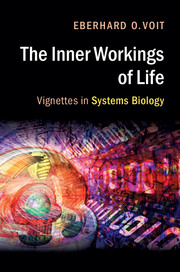Book contents
- Frontmatter
- Contents
- Appetizer
- Acknowledgments
- 1 Status: it's complicated!
- 2 I'd rather be fishin’
- 3 Whizzes and apparitions
- 4 Why?
- 5 Simply engenious!
- 6 Just a little bit
- 7 Supermodels
- 8 Close only counts in horseshoes and hand grenades
- 9 Emergence preparedness
- 10 Life without chaos?
- 11 What hath God wrought!
- 12 Tell me with whom you go and I'll tell you who you are
- 13 Time for a change!
- 14 Can't we all get along?
- 15 Love thyself and fight all others
- 16 A billion dollars for your thoughts!
- 17 The computer will see you now…
- 18 Redesigning perfect
- 19 Let's meet in the agorá!
- 20 Dessert
- Gentle jargon
- Selected further reading
- Index
19 - Let's meet in the agorá!
Published online by Cambridge University Press: 05 May 2016
- Frontmatter
- Contents
- Appetizer
- Acknowledgments
- 1 Status: it's complicated!
- 2 I'd rather be fishin’
- 3 Whizzes and apparitions
- 4 Why?
- 5 Simply engenious!
- 6 Just a little bit
- 7 Supermodels
- 8 Close only counts in horseshoes and hand grenades
- 9 Emergence preparedness
- 10 Life without chaos?
- 11 What hath God wrought!
- 12 Tell me with whom you go and I'll tell you who you are
- 13 Time for a change!
- 14 Can't we all get along?
- 15 Love thyself and fight all others
- 16 A billion dollars for your thoughts!
- 17 The computer will see you now…
- 18 Redesigning perfect
- 19 Let's meet in the agorá!
- 20 Dessert
- Gentle jargon
- Selected further reading
- Index
Summary
The agorá was the common gathering place and market of cities in ancient Greece. It was the center of activities, and nothing exhibited the pulse of the city better than the hustle and bustle in the agorá. If a philosopher felt compelled to share his wisdom with the world, if a vote were to be taken, or if one just needed to buy goods, the agorá was the place to be.
Combined with the all-important ancient concept of the division of labor, a common center for trading goods and thoughts is arguably one of the oldest and persistent creations of humankind. If I grow grain and my neighbor has sheep, it is quite natural to meet and barter. Another neighbor may trade wood or bricks, fine lace or expensive jewelry, and it soon makes a lot of sense to centralize the trading activities in a common market. While bartering is the most natural means of exchanging goods, the daily haggling soon becomes repetitive and tiring, and frequent traders develop guidelines and conversion factors, and eventually create a widely accepted currency.
Systems biology is the modern agorá in the intersection of many disciplines, most notably biology, chemistry, physics, math, computer science, and engineering. Scientists from different backgrounds meet because they see great value in solving “grand challenge” problems whose solutions are out of their own reach. It takes many bright minds and just the right confluence of knowledge and methods to address questions of cancer or the growing threat of microorganisms that are resistant to our best drugs. No single person or even discipline is capable of developing new agricultural products that can feed expanding populations, yet grow in impoverished soils under both drought and flood conditions. So the experts meet to discuss. Biologists pose complex problems and devise and execute experiments that shed light on the problem, engineers offer to create machines for collecting data more efficiently, mathematicians and physicists provide rigorous ways to formalize and address the problems with models that are anchored in a solid theoretical foundation, and computer scientists offer fast techniques for analyzing data and models. The practitioners of each discipline know that they alone cannot manage the entire spectrum of activities that are needed to solve the complex problems that arise time and again when we deal with biomedical and environmental systems.
- Type
- Chapter
- Information
- The Inner Workings of LifeVignettes in Systems Biology, pp. 154 - 159Publisher: Cambridge University PressPrint publication year: 2016



